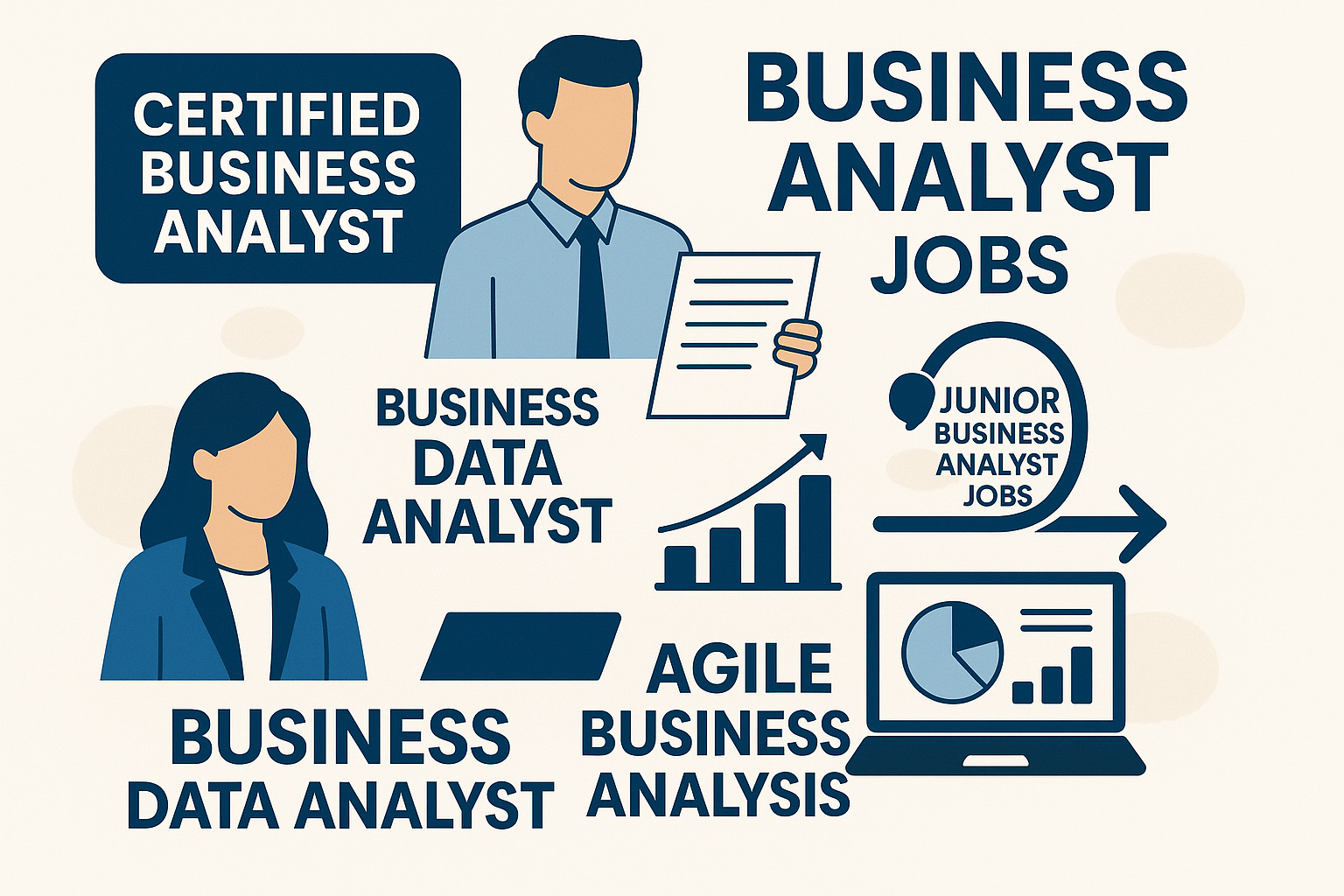The role of the business analyst is no longer limited to requirement gathering and documentation. In 2025, certified business analysts are at the forefront of digital transformation, driving strategic decisions through agile practices, data analytics, and cross-functional collaboration. With businesses prioritising innovation and efficiency, the demand for skilled, certified BAs is soaring across sectors like finance, healthcare, IT, and e-commerce.
This blog explores the emerging trends in business analyst jobs, the rising value of industry-recognised certifications, and the growing career opportunities for those who combine domain knowledge with analytical expertise. Whether you’re an aspiring BA or a seasoned professional, understanding these shifts is key to staying relevant and future-ready in this high-impact role.
Rising Demand for Certified Business Analysts
The demand for certified business analysts continues to escalate as organisations increasingly recognise the strategic value they bring. Certifications, such as the Certified Business Analysis Professional (CBAP) and the Entry Certificate in Business Analysis (ECBA), significantly boost employability, ensuring that practitioners meet global standards. Companies are actively seeking professionals who can demonstrate structured analytical skills and in-depth business knowledge, driving increased opportunities for certified individuals.
Junior Business Analyst Roles – The Gateway to Career Advancement
For aspiring professionals, junior business analyst roles are one of the best entry points into the fast-growing world of business analytics. These roles offer a strong foundation in key areas such as business process mapping, stakeholder communication, and basic proficiency in tools like Excel, JIRA, and Power BI. They also expose candidates to real-world project cycles and team dynamics.
In 2025, organisations across industries are actively investing in structured onboarding programs, mentorship, and skill development tracks to support junior analysts. Many employers now prefer candidates with entry-level certifications (like ECBA or Google Data Analytics), or demonstrable problem-solving and analytical thinking, making it a promising career launchpad for fresh graduates and professionals transitioning from non-technical roles.
As companies recognise the long-term value of nurturing internal talent, these junior positions are no longer limited to support roles—they are the stepping stones to mid-level and senior business analyst careers, offering accelerated growth for those who learn continuously and adapt to emerging tools and methodologies.

The Expanding Scope of Business Data Analysts
The business data analyst role is quickly emerging as one of the most in-demand specialisations within the analytics and business strategy space. Fueled by the exponential growth in data generation and the urgent need for data-driven decision-making, organisations are seeking professionals who can bridge the gap between business context and technical analysis.
Business data analysts apply advanced skills in SQL, Python, and predictive analytics while using visualisation tools like Power BI and Tableau to communicate insights effectively. They go beyond descriptive metrics, uncovering trends, forecasting outcomes, and making precise, evidence-based recommendations that shape operational and strategic decisions.
As companies shift from intuition-led models to data-centric business models, this niche role is becoming a cornerstone of transformation. The demand for skilled business data analysts in 2025 is expected to surge, making it a high-impact career path within the evolving business analyst ecosystem.
Agile Business Analysis – Driving Project Efficiency
The widespread adoption of Agile methodologies continues to revolutionise how business analysis is practised. Agile business analysts play a crucial role in iterative project environments by facilitating clear communication between stakeholders, development teams, and customers. This collaborative approach significantly reduces project risks, aligns product deliverables closely with user expectations, and accelerates time-to-market.
In 2025, agile business analysis is becoming increasingly specialised, prompting the development of dedicated agile certifications. Organisations prefer candidates familiar with methodologies such as Scrum and Kanban, emphasising adaptability, continuous improvement, and rapid feedback integration.
Business Analyst Programs and Continuous Learning
In 2025, staying competitive as a business analyst requires more than foundational knowledge—it demands continuous upskilling. Recognising this shift, educational institutions, online platforms, and industry bodies are expanding their business analyst programs to meet the growing demand for tech-savvy, data-literate professionals.
These programs now offer comprehensive learning paths that go beyond basic requirement gathering and stakeholder management. They cover advanced domains such as:
- Agile methodologies and Scrum practices
- Business Intelligence (BI) tools like Power BI and Tableau
- Data analytics and predictive modelling
- Process improvement frameworks such as Lean Six Sigma
The surge in online enrollment reflects a clear market trend: modern business analysts must be adaptable, cross-functional, and future-ready. Certifications like CBAP, PMI-PBA, and AgileBA are gaining popularity, while practical, hands-on training remains a top priority.
Looking to future-proof your skillset? Explore real-world business analyst training programs at Analytiq Lab, designed for aspiring and experienced professionals alike.
Conclusion
As digital transformation accelerates across industries, the role of the certified business analyst is evolving into a more strategic, data-driven, and technology-enabled function. From AI-powered analytics to agile product ownership and cross-functional collaboration, 2025 presents a wealth of opportunities for professionals who are certified, adaptable, and forward-looking.
To stay competitive, certified BAs must go beyond foundational skills and embrace:
- AI and automation tools for faster insights and decision-making
- Industry-specific trends in fintech, healthtech, and supply chain analytics
- Product thinking and a stronger alignment with customer value
- Continuous learning through platforms like Analytiq Lab
Whether you’re just starting your certification journey or looking to elevate your impact, now is the time to future-proof your career and take full advantage of the emerging roles, technologies, and leadership pathways open to business analysts.
The future belongs to analysts who think strategically, learn continuously, and lead confidently.


